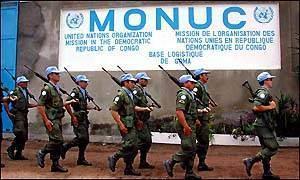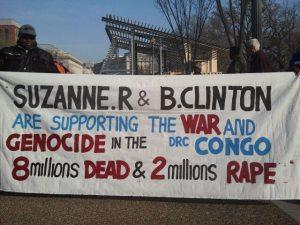By Patrick Mbeko

UN peacekeepers
On 14 July 1960, the Security Council passes a resolution in accordance with the wishes of the Congolese government, which asks Belgium to withdraw its troops from the territory of the Republic of Congo and authorizes the Secretary General of the UN, Dag Hammarskjöld, to provide technical military assistance to the Congolese government until Congolese armed forces are able to assume fully their responsibilities.
The United Nations in the Congo (ONUC in its French acronym) was thus created. But instead of taking up the cause of the legitimate government of the country, the peacekeepers put the Congolese government on the same pedestal the secessionist province of Katanga supported by Belgium.
In fact, the United Nations endorse a neo-colonial situation in Katanga. Instead of maintaining peace and restoring order, the UN peacekeepers worked on the destabilization of the Congolese government up to taking part in the assassination of the first Prime Minister of Congo Patrice Emery Lumumba.
The 2000 men of the United Nations Interim Force in Lebanon (UNIFIL in its French acronym) was established in 1978 to confirm the withdrawal of Israeli troops from southern Lebanon and restore “the sovereignty of the Lebanese state,” did not prevent the country from slipping into violence.
In April 1994, while Rwanda is experiencing a series of events of extreme violence, the United States and Belgium demand the outright withdrawal of peacekeepers of the United Nations Mission (UNAMIR) in the country.
In the correspondence he sent to the Secretary General Boutros Boutros-Ghali, the Belgian Minister of Foreign Affairs ─ Willy Claes, who will be later rewarded with an appointment as Secretary General of NATO, on American recommendation, recommends “the suspension of the UNAMIR mission” whose usefulness has become “irrelevant.”
Before the outcry from several countries, Uncle Sam threatened to veto any initiative tending to keep the UN force in the country of a thousand hills. The UN had just, by this act, condemned to death thousands of Rwandans when the latter were more than ever in need of help.
UN military contingent will pass from 3000 to 270 men, mostly Bangladeshi and Ghanaian peacekeepers. Boutros-Ghali later stated that “the Rwandan genocide is 100% the responsibility of the US government.”
The hybrid operation United Nations – African Union in Darfur (UNAMID), established on 31 July 2007 after the adoption of resolution 1769 of the Security Council, with a mandate to protect civilians, ensure the safety of humanitarian aid, monitor and verify the implementation of agreements, promote an inclusive political process, contribute to the promotion of human rights and the rule of law and to monitor the situation along the borders with Chad and the Central African Republic (CAR) and report. But since then, the situation on the ground has not changed, it went even deteriorating.
In Ivory Coast, peacekeepers of the United Nations Operation (UNOCI), instead of ensuring maintenance of peace, have plunged the country into chaos.
Since 1999, 17000 men of the United Nations Stabilization Mission in the Democratic Republic of the Congo (MONUSCO) are unable to ensure the safety of civilians in the eastern regions victim of insecurity maintained by armed groups backed by neighbouring countries. Currently, there are violent clashes between the Congolese army and Rwandan elements of M23.
What is MONUSCO doing?
It observes. Meanwhile, men, women and children are massacred; hundreds of thousands are displaced, and the country is looted. Congolese are outraged. “In any case, I do not know what MONUSCO is doing,” says Nathalie interviewed by foreign media. They came to Congo during the war to protect Congolese, especially those in the East. Despite their presence, war is persistently occurring.
Raping is ongoing, killings and displacement of populations,” she deplores. Her assessment is crystal clear: “They do nothing to protect the population. I think they are there on a particular mission that people are not aware of.”
But what is the role of the UN peacekeepers? In reality, not much if it is not to defend the interests of certain powers.
If MONUSCO is not more effective than were the UNAMIR in Rwanda in 1994, UNIFIL in Lebanon in 1978 or UNOCI in Côte d’Ivoire … it is simply because they do not want it to be. We’re witnessing what General Bricmont has called the “Strategy of the Blue Angel”, that is to say, a comprehensive strategy of destabilization which consists of pretending that you are taking care of an issue while in reality you are not doing anything about it. Perhaps it should also be interesting to look into the motivations of these “peacekeepers,” and therefore even the origin of the (blue helmet) concept, while peacekeepers are perceived by the public as a necessity to end conflicts in the world.
In 1956, when the Canadian Prime Minister Lester B. Person, then president of the UN General Assembly, filed a resolution for the creation of an international emergency force ─ precursor of the concept of blue berets and peacekeepers, making Pearson the father of the international concept of peacekeeping, the peace Nobel prize he received for the initiative clearly demonstrates the facts ─ to resolve the Suez Crisis, the goal, but unstated, is to entrust organizations such as the UN and the Commonwealth, the task of defending the interests of the West, not to frustrate the USSR and some developing countries ─ because of the Cold War context. More concretely, Canada strove to maintain the unity and cohesion of international organizations essential to the interests of the West, in particular NATO.
Through the UN peacekeepers, Western powers were enabled to act without raising the suspicions of the Soviets and other developing countries. This explains at great extent the incredible attitude of peacekeepers to the country of Lumumba. So to speak, MONUSCO only further strengthen the hegemonic policy of powers that profit from the created chaos to continue plunder peacefully [figuratively] DRC riches. Peacekeepers do not prevent the massacres; they only count the dead and report. “They are mercenaries of peace,” says a diplomat. “But they remain foremost mercenaries.”

Former UN Secretary General Boutros-Ghali later stated that “the Rwandan genocide was 100% the responsibility of the US government.”
They can not be asked to go and get killed as soldiers defending their land or their country.” One thing is certain: the constant reference to the mythic and idealized form of “peacekeeping” merely serves that to obscure the true role of missions called “peacekeeping” in areas of strategic importance; which missions are still used today in DR-Congo ─ MONUSCO – by the same imperialist powers to achieve ulterior objectives in the African Great Lakes region.
Translation from French to English by Ambrose Nzeyimana
Source: Ingeta
